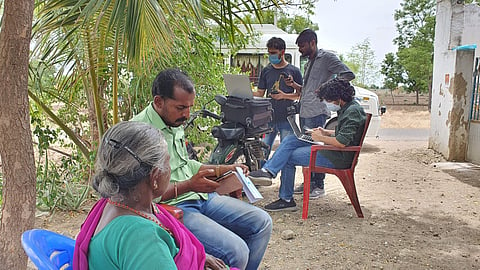

A digital ledger that is a repository of all the information that a farmer could possibly require at any stage of production or retail — that is the idea that forms the crux of the Inclusive Growth Chain (IGC) platform that researchers at the University of Hyderabad (UoH) have created in collaboration with Social Education Economical Development Society (SEEDS), a Farmer Producers Organisation (FPO) based in Tamil Nadu and Samunnati, a value chain firm that specialises in agri-lending, while Synchrony's CSR Funds helped boost the project. In the initial stages, the International Business Machines (IBM) mentorship programme helped the team develop the private Blockchain and while there were minor hurdles with securing enough human resources to work with the technology, over time, they managed to smooth things out.
The team, led by Prof Vijay Marisetty and Prof Varsha Mamidi from the School of Management Studies at UoH, worked with 30,000 farmers in Virudhunagar, Tamil Nadu, familiarising them with the technology and how they can leverage this Blockchain ledger with the help of a mobile app developed as part of the project. All transactions and information is logged onto the Blockchain and can be accessed through the mobile app developed by the team, which also consists of four research scholars from the varsity. “The mobile app has a voice bot that converses with the farmers in their native tongue, which is Tamil right now, and they can get their questions answered,” shares Prof Vijay, who has been working with Blockchain technology with Prof Varsha for about two years now.
"The objective of the IGC is to ensure that information across all the ecosystem players such as input suppliers, output markets, insurance companies, finance companies, and all such stakeholders associated with farmers, can have a common, decentralised ledger so that there is no issue in reconciliation in the entire process of production and retail," Prof Vijay explains, stating that the process will reduce the operating costs for farmers by letting them access the best prices, without involving middlemen. Congregating input suppliers and buyers under one platform will also help them gauge the aggregate demand from the farmers. Lenders can issue tokens which are available for specific purposes on the Blockchain platform. For example, if a farmer wants to purchase seeds, he can use tokens specifically issued for that, minimising misutilisation of funds. Assets can be traced on IGC, allowing lenders to monitor asset quality and reduce bankruptcy rate.
And while there are huge environmental concerns propping up about Blockchain technology, given the high energy consumption involved in minting tokens employed on these platforms, Prof Vijay assures that these don’t apply to an enterprise, private Blockchain such as IGC, which uses the relatively energy-efficient Proof of Authority mechanism rather than the infamous Proof of Work algorithm. “We employ a hyper-ledger fabric. In case of proof of work, any outsider can access the information, whereas in proof of authority, it is available only to the authorised people. It is business-friendly and the information stays within the network,” he elaborates. Speaking about the goals for the project, Prof Vijay says that while Telangana is their next target market, they are aiming to reach out to five million farmers year on year and integrate them onto the platform along with all FPOs across the country. “Such a farmer-centric Blockchain system has not been developed anywhere else. We are the first to do it,” states Prof Vijay.
The team had to cross infrastructural hurdles with regards to devices and internet connectivity in the villages. Prof Vijay shares that women farmers generally do not have access to smartphones, but the lockdown and the subsequent need for online classes has been a blessing in disguise for them, as they've had to purchase or be provided with the devices for online classes. Prof Vijay realises the need for research and in-depth study in the field. The National Education Policy lays colossal stress on Artificial Intelligence and Machine Learning technologies and the professor seems to agree. “The challenge will be to get good resources who have an understanding of the technology. There is definitely a need to take it seriously by introducing more training programmes and developing skills,” says the professor, adding that there are plans to introduce Blockchain tech as an elective for the MBA Business Analytics students.
Reach out: inclusivegrowthchain.com
